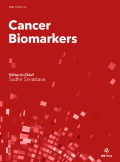Authors: Wang, Cheng-Yang | Ding, Huan-Zhang | Tang, Xiao | Li, Ze-Geng
Article Type:
Research Article
Abstract:
OBJECTIVE: The present study investigates the differences in immune function, hemorheological alterations and prognostic evaluation in colorectal cancer (CRC) patients with different traditional Chinese medicine (TCM) syndromes. METHODS: A total of 128 patients, diagnosed as stage II and III of CRC, were recruited. They were assigned into three TCM syndromes: deficiency syndrome, excess syndrome, and syndrome of intermingled deficiency and excess, and another 53 healthy individuals were selected as the control. Flow cytometry was used to determine the peripheral blood lymphocyte subsets (the levels of CD + 3 , CD
…+ 4 , CD + 8 , NK cells, and the ratios of CD + 4 /CD + 8 , Th1/Th2 and Tc1/Tc2). Whole blood viscosity (WBV), plasma viscosity (PV), hematocrit (Hct), erythrocyte sedimentation rate (ESR), plasma fibrinogen concentration (PFC) were measured using a fully-automatic blood rheological instrument. The univariate analysis and Cox regression analysis were conducted to evaluate the prognosis of CRC patients with different TCM syndromes. RESULTS: Compared with healthy individuals, CRC patients with three different syndromes had lower levels of CD + 3 , CD + 4 , NK cells, and ratios of CD + 4 /CD + 8 , Th1/Th2 and Tc1/Tc2, but higher level of CD + 8 , WBV, PV, Hct, ESR and PFC. Besides, patients with excess syndrome showed the highest levels of CD3 + , CD4 + and NK cells, and ratios of CD + 4 /CD + 8 , Th1/Th2 and Tc1/Tc2, but the lowest level of CD + 8 among three syndromes, and those with deficiency syndrome showed an opposite trend. Compared with patients with excess syndrome, those with deficiency syndrome showed decreased WBV, PV, Hct, ESR and PFC. The pathological type, surgical approach, tumor node metastasis (TNM) stage, liver metastasis, TCM treatment time and different TCM syndromes were independent factors of prognostic survival in CRC patients except perioperative blood transfusion volume. CONCLUSIONS: Taken together, we conclude that patients with TCM deficiency syndrome has lower immune function and poorer prognosis while patients with TCM excess syndrome has higher immune function and better prognosis of CRC.
Show more
Keywords: Colorectal cancer, traditional Chinese medicine syndrome, immune function, hemorheological alteration, prognosis
DOI: 10.3233/CBM-170805
Citation: Cancer Biomarkers,
vol. 21, no. 3, pp. 701-710, 2018
Price: EUR 27.50





